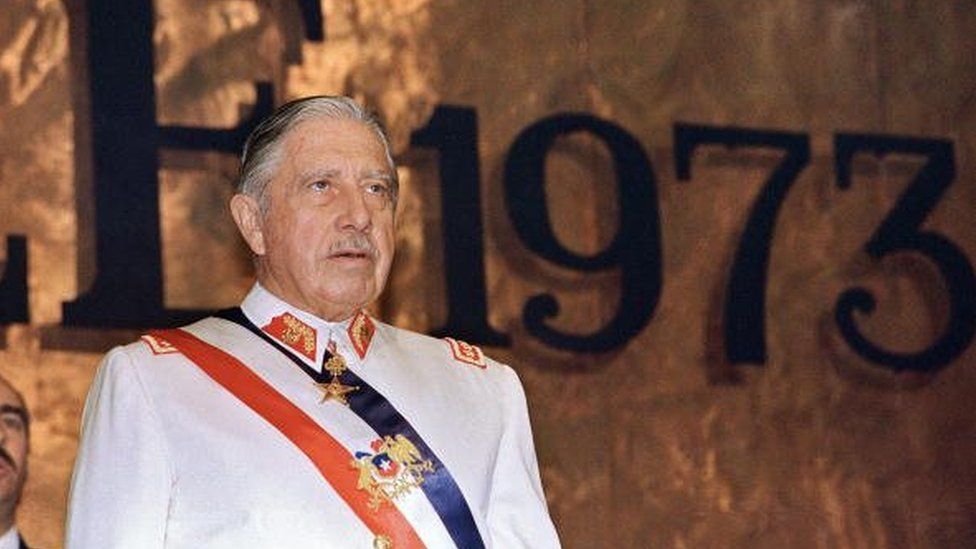Chile: The lesser known years of Gen Augusto Pinochet's life
- Published

Nine years have passed since Chile's former military ruler, Augusto Pinochet, died. Gen Pinochet left an indelible mark on the Latin American country.
More than 3,000 people were killed or forcibly "disappeared" under his rule from 1973 to 1990. Many more were tortured and driven into exile. The image of Gen Pinochet in his military uniform is still controversial in Chile, but there are still some supporters who defend him and his government.
But as BBC Mundo's Constanza Hola Chamy reports, little is known about Gen Pinochet's school days before he became one of Latin America's most feared military rulers.
I have something in common with one of the most feared leaders of Latin America: I went to the same school as Gen Augusto Pinochet.
I was born and raised in Valparaiso, the city where Gen Pinochet was born a century ago.
The Sagrados Corazones school (SS.CC.) was one of the most traditional buildings in town and, founded in 1837, one of the oldest private schools in South America.
I spent my childhood playing within its walls and listening to the stories about a former student who proclaimed himself president.
Gen Pinochet took power in Chile after overthrowing the democratically elected government of Salvador Allende in 1973.
'Mother's boy'
Forty-five years earlier, in 1928, he enrolled at the school, where he spent five years before moving on to study at a military academy.
He had just returned to Valparaiso after two years of living in the countryside with his family.
His younger brothers stayed behind at a boarding school, but Augusto, who was very close to his mother Avelina, moved with his parents to Valparaiso.
Gen Pinochet's mother was very religious, so it came as no surprise that she would place her son in a Catholic school such a Sagrados Corazones.
"He was my mother's favourite," recalls Gen Pinochet's youngest sister, Teresa.
She said it was a bond which lasted a lifetime.
"He was very sweet with her. He visited her every day before work, this was the first thing he would do. They got on really well," Teresa Pinochet, the only sibling who is still alive, recalls.
Poor student?
At school, Gen Pinochet did not shine.
He was given the nickname Donkey, allegedly because of his braying laugh.
However, the story told at my school was that the nickname referred not to his laugh but to his poor performance at school.
His school records show he was a middling student, neither the worst not the best.
Some of his subjects he barely passed with the minimum grade necessary, but at others he excelled, receiving some awards for his work in art.
One year, he was also received an award for coming first in his maths class.
Gen Pinochet said he enjoyed studying French and also speaking Latin, which he practised when praying and in mass.
Alumnus
By the time I attended Sagrados Corazones 60 years later, there were not many students who were proud of its most famous alumnus.
Gonzalo San Martin attended at the same time I did and now teaches at the school, which is housed in new premises.
"One day we found an autographed photo of Gen Pinochet," he recalls.
"This was in the 1990s, when Chile had stopped being a dictatorship and most of us had been taught at home that Pinochet was bad," he explains.
"So we hung the photo on the wall and used to throw darts at it."
Some Chileans did not need to be taught about Gen Pinochet by their parents.
Haunting memories
Carmen Hertz is a former director of the Human Rights division of the Foreign Affairs Ministry of Chile and a lawyer who has dedicated her life to the cause of human rights.
Her husband, Communist activist Carlos Berger, disappeared in 1973. His remains were only found more than 40 years later, in January 2014.
He was a victim of the Caravan of Death, a Chilean army death squad thought to have killed almost 100 people opposed to military rule.
For her, whatever influence the Sagrados Corazones may or may not have had on Gen Pinochet's life is irrelevant.
"Whatever schooling he had doesn't reflect what he became in later life," she says.
Gen Pinochet was indicted in connection with the crimes committed by the Caravan of Death but died before he could be judged.
For Ms Hertz the case is clear-cut. "Pinochet was an instigator of state terrorism and the conductor of a policy of extermination," she says.
But there are also Chileans who remember him fondly, arguing that he "saved Chile from communism".
A handful of his loyal supporters recently attended a ceremony commemorating the centenary of his birth.
But today's pupils at Sagrados Corazones are unlikely to come across any mementos of the late military ruler.
The school has moved to a new, modern building. The old building now stands empty and half abandoned.
Some say that Gen Pinochet's ghost still haunts the old corridors where he used to play as a pupil, much in the same way that his memory still haunts so many in Chilean society.
- Published9 September 2013
- Published6 September 2013
- Published6 February 2013